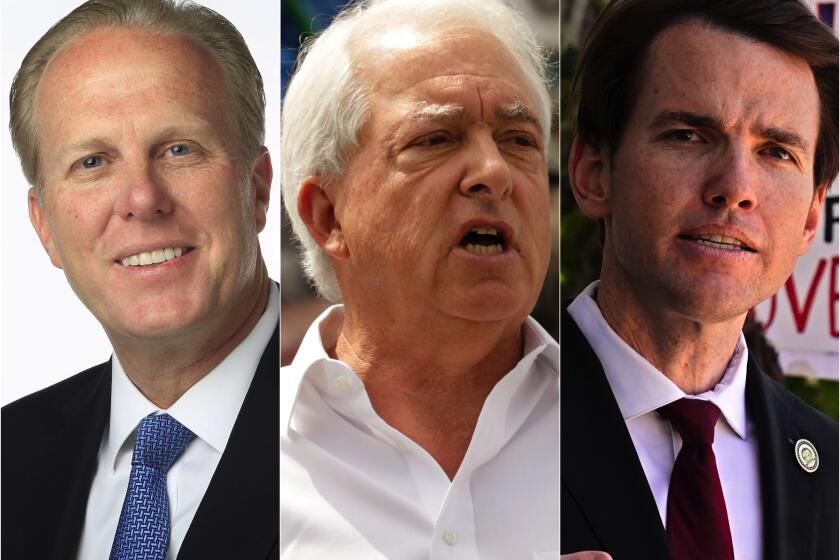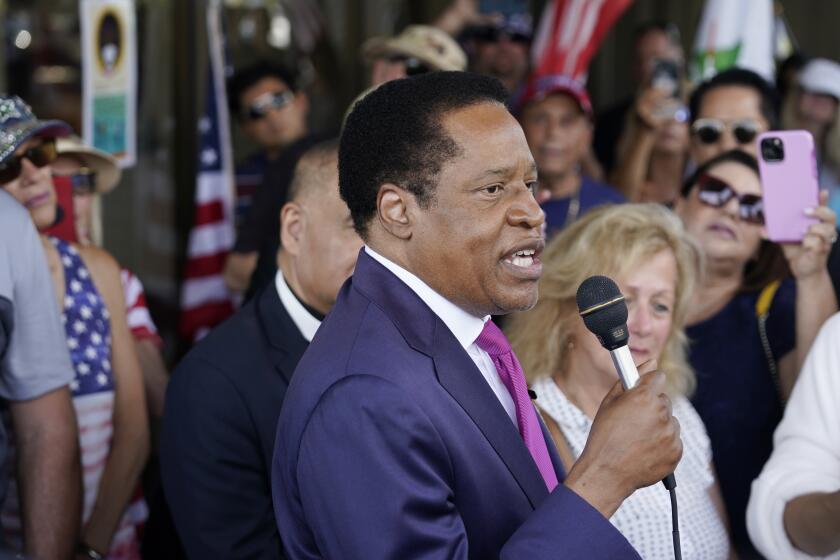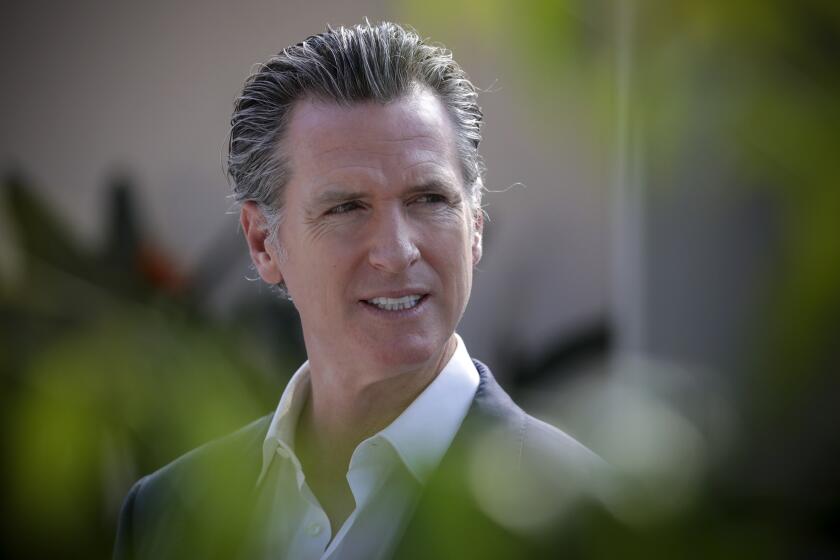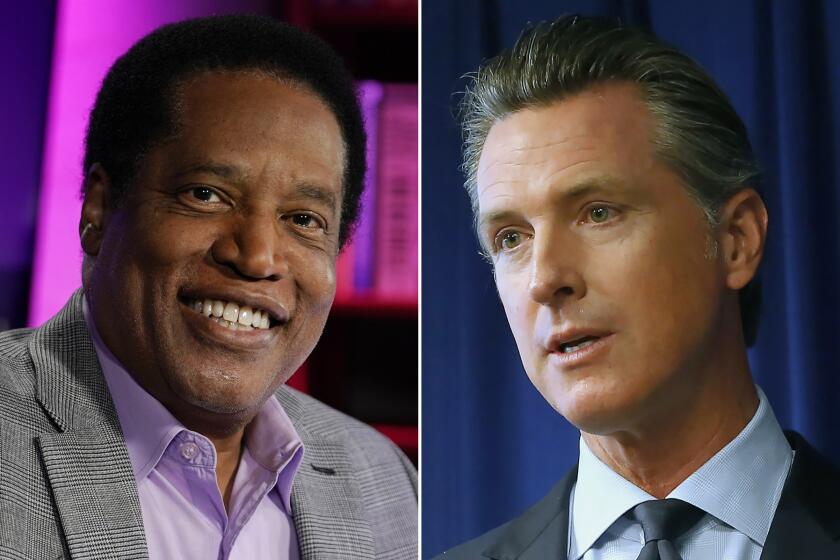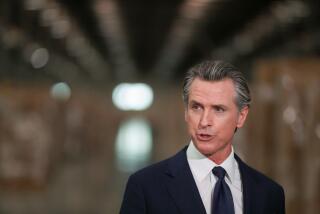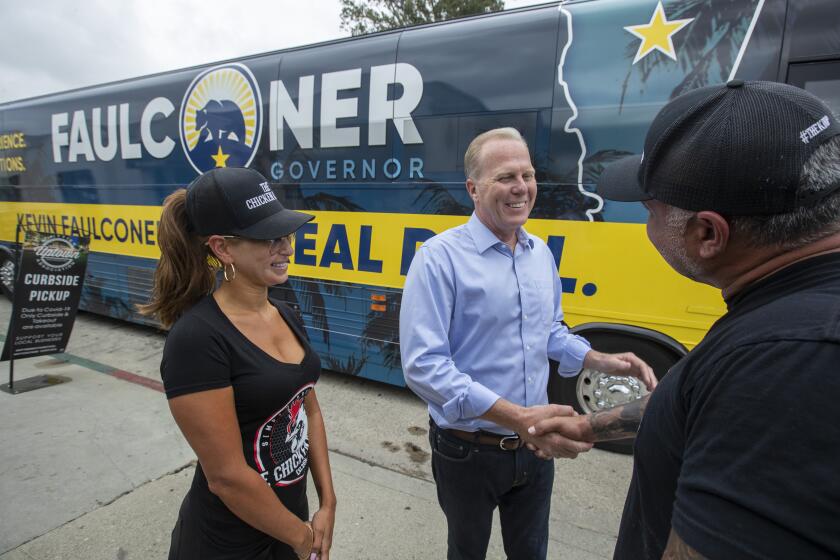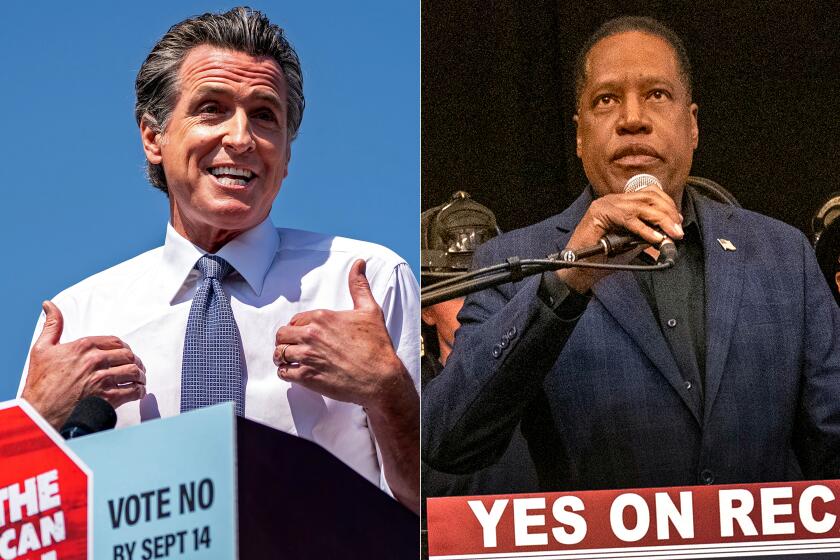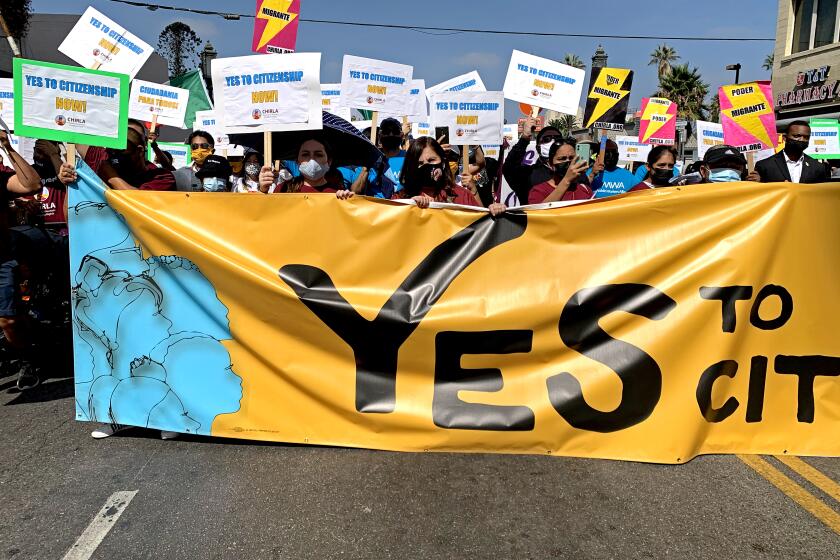How Trump-hating California got a slate of recall candidates who supported Trump
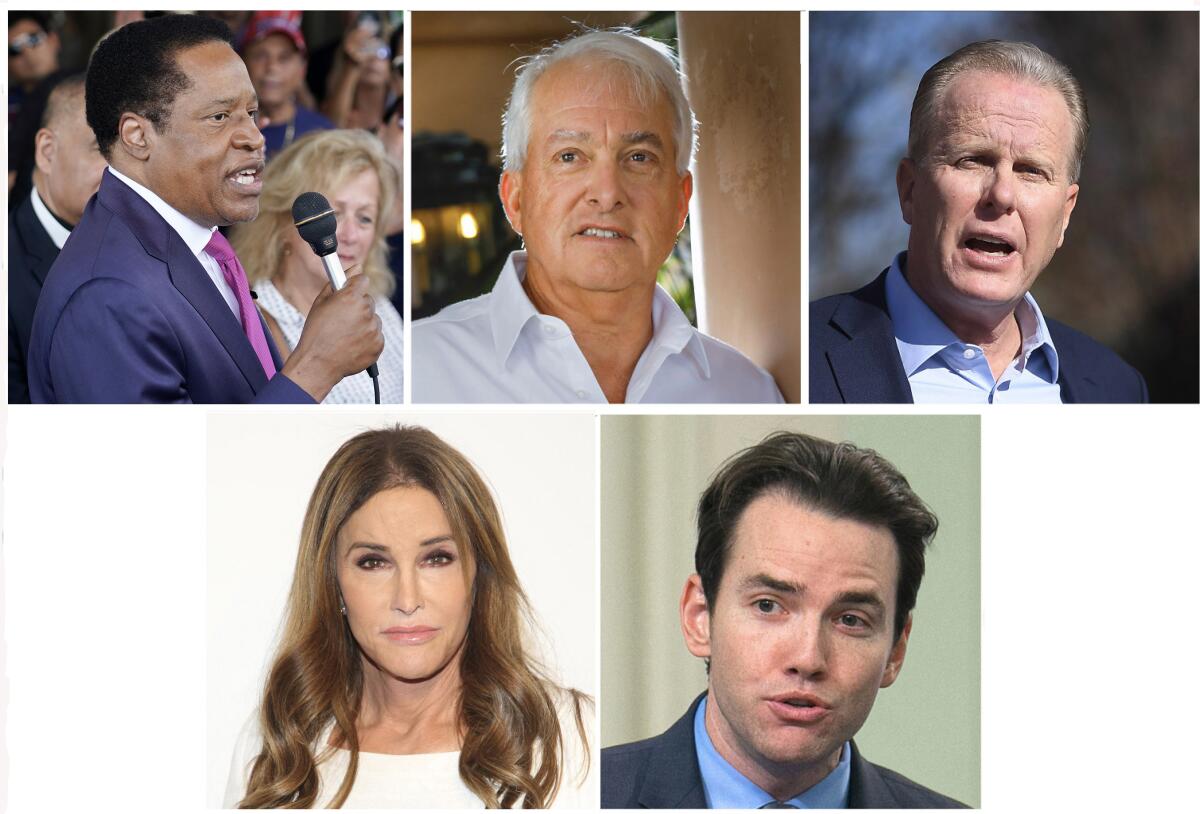
- Share via
With a historic gubernatorial recall election just weeks away, California voters will soon decide whether they want to remove Gov. Gavin Newsom and, if so, who should succeed him as governor.
Despite no longer being in office, former President Trump has loomed large over the race. Newsom has fought to tie the effort to Trump, who is widely unpopular in the state, while the Republican candidates have had to navigate a party remade by the specter of the former president.
For the record:
1:18 p.m. Aug. 21, 2021Assemblyman Kevin Kiley largely wrote his book in his house, not an apartment as an earlier version of this story incorrectly stated.
California prided itself as being the center of the “resistance” to Trump, but Trump also received more votes in California in November than in any other state.
It’s a quirk of California’s hulking size that such a Democratic stronghold — President Biden overwhelmingly won the state with 63.5% of the vote — could also be home to more Trump voters than anywhere else.
This central paradox of modern California politics — an incongruity usually obscured by the sheer number of registered Democrats in the state — could define the outcome of the recall election.
Having successfully deterred any prominent Democratic politician from running, Newsom and the state Democratic Party are urging voters to leave the second question on the ballot blank. That means if voters recall the Democratic governor from office next month, his replacement is likely to come from a group of top Republican candidates — almost all of whom have publicly supported Trump.
And if California’s overwhelming Democratic majority doesn’t weigh in on the second question, Newsom’s successor could be chosen by a GOP electorate that’s much further to the right than it was the last time a Republican won statewide office in California. Polls show far-right Republicans leading if Newsom is replaced, and the winner could be elected with only a fraction of the total vote.
How we got here
California is now all but synonymous with the Democratic Party, but for decades it leaned to the right. Republicans won the state in all but one presidential election between 1952 and 1988, and California had both Democratic and Republican governors during that period.
Former San Diego Mayor Kevin Faulconer, Rancho Santa Fe businessman John Cox and Assemblyman Kevin Kiley of Rocklin traded views on issues such as homelessness, the minimum wage and Gavin Newsom’s zero car emissions executive order.
The state was once known for producing moderate Republicans who tended to hold more liberal — or at least libertarian — positions on social issues than the national party. But as the state grew more blue overall, its shrinking GOP contingent became decidedly more conservative.
Consider California’s last two Republican governors, Pete Wilson and Arnold Schwarzenegger.
“The whole way both men conducted their administrations, it was generally pro-choice, fiscally conservative, pro-environment,” said Joe Rodota, an author and political consultant who worked for both Wilson and Schwarzenegger.
Experts say Wilson and Schwarzenegger embodied a more moderate California Republican ethos than the positions taken by most of the 2021 Republican gubernatorial field.
“The Republicans from the Schwarzenegger and Wilson era, and to some extent the [George] Deukmejian era, many of them may have become ‘no party preference’ or they may have moved to another place, another state,” Rodota said.
Party concentration has also moved inland, with Republican votes in Los Angeles and the Bay Area starkly declining.
“It wouldn’t be quite as socially conservative or uniform as in, say, a Southern state, but it is still a significantly more conservative Republican electorate in the state on social issues, in particular,” said Eric Schickler, co-director of the UC Berkeley Institute of Governmental Studies.
The California Republican Party of today is “driven much more by cultural issues, which is a national change of the electorate — social issues tie into that,” added Mike Madrid, a GOP consultant and co-founder of the anti-Trump Lincoln Project.
Of the 46 candidates, five have emerged as the most prominent Republican contenders: John Cox, Larry Elder, Kevin Faulconer, Caitlyn Jenner and Kevin Kiley. All five have polled at or above 5% in at least one major poll and participated — or been invited to participate — in major candidate debates.
The front-runner
Elder, a longtime talk radio host, quickly shot to the top of the field after entering the race a little over a month ago.
His strong libertarian views distinguish him ideologically from the rest of the pack, as do some of the convention-defying positions he has entertained on a wide array of topics.
For instance, Elder believes in eliminating the minimum wage entirely, whereas Cox and Kiley both believe that at least some form of government-mandated minimum wage is necessary, in keeping with the national GOP consensus on the issue.
Elder has said that he would work to reduce tax burdens and alleviate regulatory barriers on entrepreneurship, support school choice and rein in government spending. He also opposes gun control and paid family leave and has called the Roe vs. Wade ruling, which created a legal right to abortion, “one of the worst decisions that the Supreme Court ever handed down.”
Larry Elder leapfrogs the others vying to replace Newsom, with provocative stances from firing teachers to downplaying the dangers of secondhand smoke.
On his show, Elder has given airtime to misinformation and views that contradict the scientific consensus on issues such as smoking, climate change and the best ways to treat COVID-19.
In a 2000 column for Capitalism Magazine, Elder said Democrats had an advantage over Republicans because they were supported by women, and “women know less than men about political issues, economics and current events.”
With his rise to the top of the field, Elder in recent weeks has become the primary target of the Newsom anti-recall campaign, which has sent out at least four emails sharply criticizing him, including one directly comparing Elder to Trump. Elder notably mentored Stephen Miller, the architect of Trump-era immigration policies.
The pro-Trump moderate
Faulconer, a former San Diego mayor, is the most centrist of the pack, and the most ideologically similar to the last Republicans to win statewide office.
Like many of the other Republican recall candidates, Faulconer has proposed significant tax cuts, pledged to reform the California Environmental Quality Act to make it easier to build housing and wants to roll back some of the criminal justice reform efforts passed by California voters in recent years.
He also supports abortion rights, worked to formulate a San Diego climate action plan and backs immigration reform. When he ran for San Diego mayor in 2013, his campaign spokesperson tweeted that Faulconer “would be a Dem back east. He’s definitely not a Republican’s Republican.”
Faulconer is widely viewed as the establishment party candidate, with endorsements from the majority of Republicans in the Legislature. But his detailed policy memos and unflashy candidacy have struggled to gain attention or sustain momentum.
Amid the live bears, giant balls of trash and tabloid star power put forth by his opponents, the closest Faulconer has come to a campaign stunt was a lightly viewed YouTube video in which he prepared a vanilla ice cream sundae while listing his policy plans as a kind of meta-commentary on his “vanilla” candidacy.
Though Faulconer was twice elected mayor in a city where Democrats hold a significant registration advantage over Republicans, his late-stage support of Trump might hinder his ability to pick off Democrats or left-leaning independent voters.
He posed for a smiling Oval Office photo with Trump in 2019 and supported him in the 2020 election — despite condemning his “divisive rhetoric” and saying he “could never vote for Trump” in 2016.
Gov. Gavin Newsom and Democrats are singularly focused on Californians casting a “no” vote on the first part of the recall ballot. That may leave some voters unaware they can also choose a replacement in the event Newsom loses.
Faulconer appeared to lean into GOP culture war topics during the first recall debate at the Nixon Presidential Library, joining rivals in lambasting the teaching of so-called critical race theory, which he said leads to “cancel culture.”
In Tuesday’s debate in Sacramento, Faulconer seemed eager to break out of the vanilla mold. With the uncharacteristic use of an expletive, he blasted Elder for past derogatory remarks about women.
The more traditional conservatives
Cox and Kiley are seen as the more traditional conservatives in the race.
Cox, a multimillionaire Rancho Santa Fe businessman and perennial candidate, is more prominent, having finished second in the 2018 gubernatorial primary. He lost to Newsom by a wide margin that November.
In his first campaign ad, Cox stared into the camera and told Californians he was “a businessman, not a politician” — an outsider refrain that’s been central to his unsuccessful campaigns for decades, beginning with a bid for a U.S. House seat in Illinois in 2000.
Having never held office, Cox has no voting record to analyze. But he has generally espoused slashing taxes, streamlining regulation and changing California law to force treatment on homeless people who are experiencing mental illness or addicted to drugs.
“Cox ran a very kind of traditional Republican campaign here in 2018 — you saw the results of that — and he sounds very traditional Republican again,” said Bill Whalen, a research fellow at Stanford University’s conservative Hoover Institution and chief speechwriter for former Gov. Pete Wilson. Cox was endorsed by Trump in 2018.
Cox has received attention — and some criticism — for his occasionally colorful use of props, including a 1,000-pound bear utilized as part an extended metaphor, wherein Cox rebranded himself as the aggressive “beast” while casting Newsom as the less serious “beauty.”
Kiley, at 36, is three decades younger than Cox. A Harvard University and Yale Law School graduate, Kiley entered electoral politics in 2016 after teaching high school in South Los Angeles, working at a law firm and prosecuting cases as a deputy state attorney general.
The Rocklin assemblyman was a vociferous critic of the governor during the pandemic, and the legal battle he waged over Newsom’s use of executive power has endeared him to some of the party’s most conservative followers.
Gov. Gavin Newsom and GOP talk radio show host Larry Elder are dominating the conversation about the recall. How can other candidates break through?
Kiley self-published a 234-page treatise laying out his case for recalling Newsom in January — a book he said he wrote largely while holed up in his house over the Christmas holiday.
Assembly Minority Leader Marie Waldron described Kiley via email as “a valuable voice” in the Assembly’s Republican Caucus, saying he was “passionate about keeping government in check and won’t stand for government overreach.”
Kiley has been rated highly by antiabortion groups, the Howard Jarvis Taxpayers Assn., gun rights groups and business groups, and he has received relatively poor marks from labor, environmental and civil rights groups.
He does not appear to have explicitly backed Trump, but during an interview with The Times’ editorial board, Kiley refused to say whether Biden was legitimately elected in 2020 — seemingly perpetuating baseless and widely debunked claims of election fraud.
All of the other leading Republican candidates have unequivocally characterized Biden as the legitimately elected president, except for Elder, who told the editorial board: “I believe there were shenanigans in the 2020 election, but Joe Biden is the president and Donald Trump is sitting right now, I think, in Florida somewhere.”
The celebrity
Name recognition has helped Elder vault over his opponents, but it has done little for Jenner, who has struggled to gain a foothold with GOP voters.
“It’s pretty interesting that Jenner got a lot of this early media attention, but it doesn’t seem like any segment of the electorate is really that supportive,” said Schickler, of the UC Berkeley Institute of Governmental Studies. “I think it’s maybe not seen as quite as serious a candidacy.”
Jenner, who recently returned to the campaign trail after a stint filming “Celebrity Big Brother” in Australia, describes herself as economically conservative but more socially liberal. Jenner — whose campaign advisors have included former Trump associates — supported Trump in the 2016 election, denounced him in 2018 and has since said she would support him if he runs again in 2024.
“I’m on the Republican side because I have conservative economic values — less taxes, less regulations, a pro-business environment…. But on the social side, I’m an inclusive Republican, meaning I’m inclusive to all people,” Jenner told reporters last week.
The reality TV star and Olympic gold-medal-winning decathlete has said she would eliminate regulations that slow the construction of new affordable housing, prioritize public safety and reevaluate government spending.
More to Read
Sign up for Essential California
The most important California stories and recommendations in your inbox every morning.
You may occasionally receive promotional content from the Los Angeles Times.
